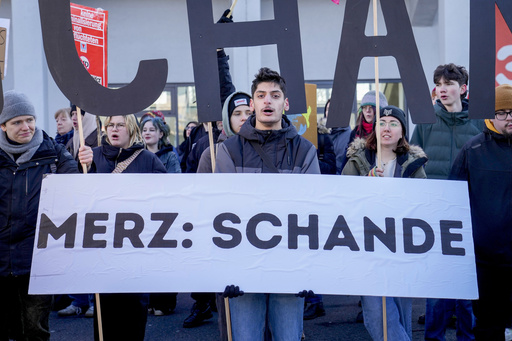
BERLIN — On Monday, the leading candidate in Germany’s forthcoming election stated that the far-right Alternative for Germany (AfD) is his “most significant adversary,” declaring his party’s commitment to never collaborate with them. This statement follows intense scrutiny he faced regarding his actions over the past week, which some interpreted as breaking the longstanding taboo against engaging with far-right factions.
Friedrich Merz, the leader of the center-right Union bloc, currently tops the polls ahead of the elections set for February 23. However, he faced backlash after proposing a parliamentary motion aimed at increasing the number of migrants that Germany could turn away at its borders. That motion secured narrow approval, aided by votes from the AfD—an event that drew swift condemnation from his rivals and a notable public rebuke from former Chancellor Angela Merkel, who previously led Merz’s own party. Over the weekend, tens of thousands of demonstrators took to the streets to voice their dissent.
In response to the widespread criticism, Merz remains steadfast in demonstrating his party’s resolve on migration issues. He maintains that his stance has not shifted and emphasizes that he will not form any alliances with the AfD, which is currently polling in second place. He attributes the migration policy deadlock to the reluctance of the center-left governing coalition to enact reforms.
“I want to convey a clear message to voters across Germany: We will not collaborate with the party that refers to itself as Alternative for Germany—neither before, during, nor after the elections. Never,” he told members of his Christian Democratic Union during a convention, which was met with applause. He added that the AfD contradicts the foundational values that his party and the nation have developed over the years, opposing Germany’s Western alliances, the euro currency, and NATO.
“It is the primary challenger for us in this election cycle—we aim to diminish its influence,” Merz asserted, reiterating that there will be no acceptance of minority governance supported by the AfD or any other form of partnership. “There are no conditions attached,” he stated emphatically.
The governing parties accuse Merz of violating his pledge not to allow any measures to pass with the AfD’s backing in the current parliament, where clear majorities are absent. Chancellor Olaf Scholz has expressed doubts about Merz’s trustworthiness, suggesting that he can no longer be relied upon to refrain from forming a government with the AfD. Merz, however, vehemently disputes these claims, insisting, “We are facing opposition, and there are protests aimed at our policies,” but emphasizes the necessity of maintaining a consistent approach to migration.

